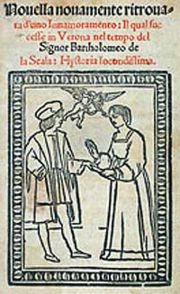O Romeo, Romeo! Wherefore art thou Romeo? Deny thy father and refuse thy name; Or, if thou wilt not, be but sworn my love, And I'll no longer be a Capulet.

A hopeless romantic, my all time favorite love story is Romeo and Juliet. Everyone knows that the story takes place in Italy ~ in the historic city of Verona. Verona is in the Veneto, the northeastern region of Italy where we made our family home for many years.
While living in Italy, I spent a good deal of time in our city library in Vicenza doing research and it was there that I first learned that the true author of Romeo and Juliet was a Vicentino, a man by the name of Luigi Da Porto. In 1530, Da Porto wrote the transcript called Giulietta e Romeo. In the original version, he set the characters in Verona, created Romeo and Giulietta and even created Mercutio, Tybalt, Friar Laurence and Paris. It is a little known fact that Luigi was the original writer and that William Shakespeare only adapted it for stage in England through not much merit of his own. The village of Vicenza (or indeed the people in it) hardly forgave Shakespeare after he took all the credit for the literature of their native son. Da Porto wrote the novel in his villa in Montorso Vicentino near Vicenza. The title of the book was Historia Novellamente Ritrovata di Due Nobili Amanti (Newly Found Story of Two Noble Lovers).
There are several film versions of this greatest of love stories, and although there are aspects of the modernized version starring Leonardo di Caprio that are fascinating to me, I shall forever be enthralled with the classic Sixties version of Italian film producer, Franco Zefferelli.
We can be grateful to Mr. William Shakespeare for his momentous contributions to the English language. Shakespeare is a part of our everyday lives. He coined more than 1,700 words still in use in modern English and his plays influence the way we think about the world we live in. In recognition of Shakespeare’s 445th Birthday, this Thursday, April 23, 2009, has been designated Talk Like Shakespeare Day. Get in on the act and unleash your inner Bard!

A hopeless romantic, my all time favorite love story is Romeo and Juliet. Everyone knows that the story takes place in Italy ~ in the historic city of Verona. Verona is in the Veneto, the northeastern region of Italy where we made our family home for many years.
While living in Italy, I spent a good deal of time in our city library in Vicenza doing research and it was there that I first learned that the true author of Romeo and Juliet was a Vicentino, a man by the name of Luigi Da Porto. In 1530, Da Porto wrote the transcript called Giulietta e Romeo. In the original version, he set the characters in Verona, created Romeo and Giulietta and even created Mercutio, Tybalt, Friar Laurence and Paris. It is a little known fact that Luigi was the original writer and that William Shakespeare only adapted it for stage in England through not much merit of his own. The village of Vicenza (or indeed the people in it) hardly forgave Shakespeare after he took all the credit for the literature of their native son. Da Porto wrote the novel in his villa in Montorso Vicentino near Vicenza. The title of the book was Historia Novellamente Ritrovata di Due Nobili Amanti (Newly Found Story of Two Noble Lovers).
There are several film versions of this greatest of love stories, and although there are aspects of the modernized version starring Leonardo di Caprio that are fascinating to me, I shall forever be enthralled with the classic Sixties version of Italian film producer, Franco Zefferelli.
We can be grateful to Mr. William Shakespeare for his momentous contributions to the English language. Shakespeare is a part of our everyday lives. He coined more than 1,700 words still in use in modern English and his plays influence the way we think about the world we live in. In recognition of Shakespeare’s 445th Birthday, this Thursday, April 23, 2009, has been designated Talk Like Shakespeare Day. Get in on the act and unleash your inner Bard!

